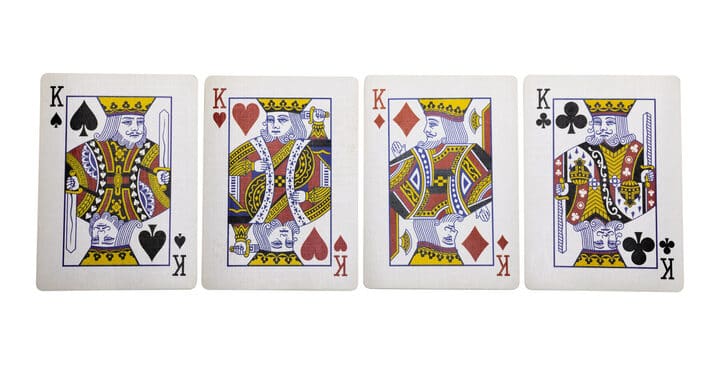They don’t make companies like they used to…
In the early 1600s, the Dutch East India Company was on top of the world. They had a complete monopoly over the spice, silk, and cotton trade. By the middle of that century, they were the richest private company in world history. The Dutch East India Company counted over 150 merchant ships, 40 warships, and its own army of 10,000 soldiers among its assets.
They even struck their own currency, the duit.
It would take me volumes to even scratch the surface of this legendary and controversial company. We’re here to talk about investing in today’s world, not historical spice trade routes. But I bring up the Dutch East India Company for one main reason: its formative record as the world’s first major stock.
The Dutch East India Company (VOC) was the first multinational corporation and led to the creation of the very first stock exchange: the Amsterdam Stock Exchange. It also became the very first company to offer shareholders a regular dividend payment.
The VOC paid annual dividends worth around 18 percent for almost 200 years of existence. That’s a hell of a track record.
We’ve written about dividend aristocrats – companies that have raised their dividend for at least twenty-five years in a row – many times. But to pay a dividend for 200 years is something we haven’t seen since.
I would call that a “Dividend Emperor.”
No company has come close to hitting the 200 mark, but you may be surprised to find out that over a dozen U.S. companies have paid annual dividends for over a century. Here’s a quick list with the year the company began paying dividends:
- General Mill (NYSE: GIS) 1898
- Johnson Controls Inc. (NYSE: JCI) 1887
- Church & Dwight Co., Inc. (NYSE: CHD) 1901
- Stanley Black & Decker, Inc. (NYSE: SWK) 1877
- Eli Lilly and Co (NYSE: LLY) 1885
- Procter & Gamble Co. (NYSE: PG) 1891
- The Coca-Cola Co (KO) 1893
- PPG Industries, Inc. (PPG) 1899
But today, we’re going to split the difference between emperors and aristocrats. I want to talk about “Dividend Kings.”
Fit for a King
Dividend Kings are companies that have been able to increase their dividend yield every year for at least 50 years. While dividend aristocrats must be part of the S&P 500 and have a market cap of at least $3 billion, and average $5 million a day in trading, dividend kings only have to have raised that dividend for 50 years.
That opens it up a bit from the aristocrat’s list.
Here’s the complete list of 2023 Dividend Kings:
| Company | Sector | Years of Dividend Increases |
| American States Water (NYSE:AWR) | Utilities | 68 |
| Dover Corporation (NYSE:DOV) | Industrials | 67 |
| Northwest Natural Holding (NYSE:NWN) | Utilities | 67 |
| Genuine Parts (NYSE:GPC) | Consumer Goods | 66 |
| Procter & Gamble (NYSE:PG) | Consumer Goods | 66 |
| Parker Hannifin (NYSE:PH) | Industrials | 66 |
| Emerson Electric (NYSE:EMR) | Industrials | 66 |
| 3M (NYSE:MMM) | Industrials | 64 |
| Cincinnati Financial (NASDAQ:CINF) | Financials | 61 |
| Johnson & Johnson (NYSE:JNJ) | Healthcare | 60 |
| Coca-Cola (NYSE:KO) | Consumer Goods | 60 |
| Lancaster Colony (NASDAQ:LANC) | Consumer Goods | 60 |
| Colgate-Palmolive (NYSE:CL) | Consumer Goods | 59 |
| Nordson (NASDAQ:NDSN) | Industrials | 59 |
| Farmers & Merchants Bancorp (OTH:FMCB) | Financials | 57 |
| Hormel Foods (NYSE:HRL) | Consumer Goods | 56 |
| ABM Industries (NYSE:ABM) | Industrials | 56 |
| California Water Service Group (NYSE:CWT) | Utilities | 55 |
| Stanley Black & Decker (NYSE:SWK) | Industrials | 55 |
| Stepan Company (NYSE:SCL) | Industrials | 55 |
| Federal Realty Investment Trust (NYSE:FRT) | Real Estate | 55 |
| Commerce Bancshares (NASDAQ:CBSH) | Financials | 54 |
| SJW Group (NYSE:SJW) | Utilities | 54 |
| Sysco (NYSE:SYY) | Consumer Goods | 53 |
| MSA Safety (NYSE:MSA) | Industrials | 53 |
| H.B. Fuller (NYSE:FUL) | Materials | 53 |
| Altria Group (NYSE:MO) | Consumer Goods | 53 |
| National Fuel Gas (NYSE:NFG) | Energy | 52 |
| Universal Corporation (NYSE:UVV) | Consumer Goods | 52 |
| Black Hills Corp. (NYSE:BKH) | Utilities | 52 |
| Illinois Tool Works (NYSE:ITW) | Industrials | 52 |
| W.W. Grainger (NYSE:GWW) | Industrials | 51 |
| Target (NYSE:TGT) | Consumer Goods | 51 |
| Leggett & Platt (NYSE:LEG) | Industrials | 51 |
| PPG Industries (NYSE:PPG) | Industrials | 51 |
| Computer Services, Inc. (OTV:CSVI) | Technology | 51 |
| Becton, Dickinson & Co. (NYSE:BDX) | Healthcare | 51 |
| AbbVie (NYSE:ABBV) | Healthcare | 51 |
| Abbott Labs (NYSE:ABT) | Healthcare | 51 |
| Tennant (NYSE:TNC) | Industrials | 50 |
| Kimberly Clark (NYSE:KMB) | Consumer Goods | 50 |
| PepsiCo (NASDAQ:PEP) | Consumer staples | 50 |
| Nucor (NYSE:NUE) | Industrials | 50 |
A New King is Crowned
Four new kings were crowned over the last year: Tennant (NYSE: TNC), Kimberly Clark (NYSE: KMB), PepsiCo (NASDAQ: PEP), and Nucor Steel (NYSE: NUE). That brings the total count of these dividend stocks to 48.
Let’s take a look at the newest member to take a seat at the royal table.
Nucor (NYSE: NUE)
Nucor is the single-largest steel producer in the United States. It is also the largest “mini-mill” steelmaker, meaning it uses electric arc furnaces to melt scrap. The sheer amount of steel the company recycles makes it the largest recycler of any material in all of North America.
Nucor is a cyclical business, which makes it a great dividend stock to dollar cost average when the steel cycle dies down.
Despite steel prices bottoming out in late 2021, Nucor still reported record net earnings of $7.61 billion, or $28.79 per diluted share, surpassing the previous record of consolidated net earnings of $6.83 billion, or $23.16 per diluted share, in 2021.
The company also returned $3.3 billion of capital to stockholders through dividends and share repurchases last year. Nucor has pledged to return 40% of its earnings back to shareholders. This could see Nucor returning at least $1 billion back to shareholders on top of increasing its intrinsic value.
While the company is only yielding 1.24%, the stock itself has seen very strong appreciation. Here’s how Nucor has performed over the past five years:
That’s a cool 164% on a solid dividend stock.
Steel will always be necessary, and Nucor is your single best bet for steady industrial income.
Kings in the Wing
Raising a dividend every year for over half a century is a tall order. Just think of all of the turmoil these companies have dealt with over the last fifty years: the Black Monday crash of 1987, the dot com boom and bust of the 2000s, the housing crisis of 2008, and the coronavirus crash of 2020. All of these companies were strong enough to not only keep their dividend but actually increase it.
Over the next year or two, we’ll see several more companies join this vaunted list.
- Telephone and Data Systems (NYSE: TDS) 49 years
- Lowe's Companies (NYSE: LOW) 49 years
- RPM International (NYSE: RPM) 49 years
- Automatic Data Processing (NASDAQ: ADP) 48 years
Time will tell if any of the above companies will drop their crown in the coming years, but if you’ve shown the resilience to make it 50 years, you’ll be hard-pressed to find a company that is willing to lose its hard-earned status as a dividend king.
Like most leaders, giving up the crown is the last thing they want, and will do almost anything to keep that powerful status.
Godspeed,

Jimmy Mengel
The Profit Sector
Follow me on Twitter @mengeled













